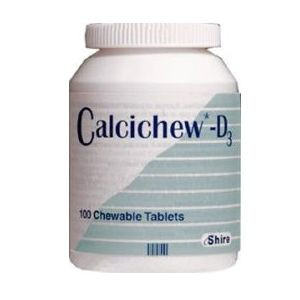Calcichew-D3 Chewable Tablets – 100 Tablets
£14.19
- Chewable Tablets
- Active Ingredients: Calcium / Colecalciferol
- Buy With Confidence From UK Registered Pharmacy
- Next Day Delivery Available
Calcichew-D3 Chewable Tablets are orange flavoured chewable tablets containing calcium and vitamin D3 which are both important substances in bone formation. Both are found in the diet and vitamin D is also produced in the skin after exposure to the sun.
In stock

Discreet Packaging

UK Based
-
What Calcichew D3 Chewable are and what it is used for
Calcichew D3 Chewable Tablets are orange flavoured chewable tablets containing calcium and vitamin D3 which are both important substances in bone formation. Both are found in the diet and vitamin D is also produced in the skin after exposure to the sun. This supplement may also be prescribed or recommended for certain bone conditions, for example osteoporosis, or during pregnancy. See more information on Calcium on the NHS website.Before you take Calcichew D3 Chewable Tablets
Do not take Calcichew- D3 Forte Chewable Tablets if you:- are allergic to calcium, vitamin D, or any of the other ingredients of this supplement
- have severe kidney problems
- have a condition that causes excessive amounts of calcium in your blood or urine (hypercalcaemia or hypercalciuria) e.g. o renal (kidney failure) o cancer that has affected your bones
- have excessive amounts of vitamin D in your blood
- have kidney stones
- if you have osteoporosis (brittle bones) and are also unable to move around
- if you are on long term treatment, especially if you are taking medicines for a heart disorder (cardiac glycosides), or diuretics (used in the treatment of high blood pressure or oedema)
- if you have signs of impaired kidney function or a high tendency to kidney stone (calculus) formation
- if you have cancer or any other condtions that may have affected your bones
- if you have sarcoidosis (an immune system disorder which may cause increased levels of vitamin D in the body)I
- sarcoidosis (an immune system disorder which may affect your liver, lungs, skin or lymph nodes)
- kidney problems
- you are on long-term treatment with Calcichew
- you are already taking additional doses of calcium or vitamin D. If you have increased calcium levels in the blood or develop signs of kidney problems, the dose of Calcichew-D3 Forte should be reduced or the treatment discontinued
How to take Calcichew D3 Chewable Tablets
Always take Calcichew- D3 Forte Tablets exactly as your doctor has told you. Check with your doctor or pharmacist if you are not sure- The recommended dose is two tablets a day, preferably one tablet in the morning and one tablet in the evening.The tablet may be chewed or sucked
- Calcichew-D3 Forte chewable tablets are not recommended for use in children
How to store Calcichew D3 Chewable Tablets
- Keep out of the sight and reach of children
- Store in the original package
- Keep container tightly closed to protect from moisture
- Do not store above 30°C
- Do not use Calcichew- D3 Forte Tablets after the expiry date
- If the tablets have changed shape or colour do not use
- Do not throw away any supplements via wastewater or household waste
- Ask your pharmacist how to throw away supplements you no longer use
- These measures will help to protect the environment
Ingredients
The active ingredients in each tablet are:- 1250mg calcium carbonate (equivalent to 500 mg calcium)
- 200IU colecalciferol (equivalent to 5 micrograms Vitamin D3)
- xylitol (E967), povidone, isomalt (E953), fatty acid mono- and di-glycerides, magnesium stearate, orange flavour, sucralose (E955), sucrose, tocopherol, modified maize starch, medium chain triglycerides, sodium ascorbate and anhydrous colloidal silica













